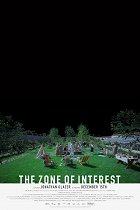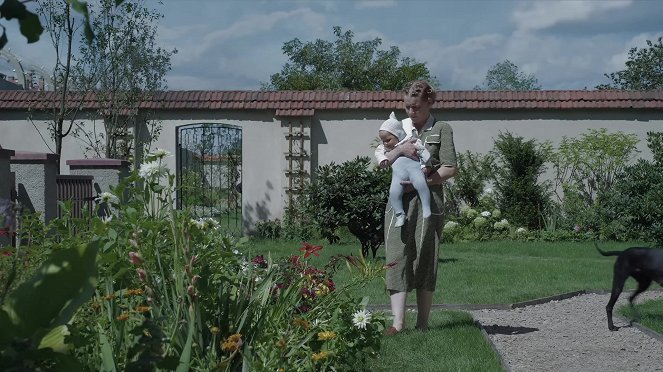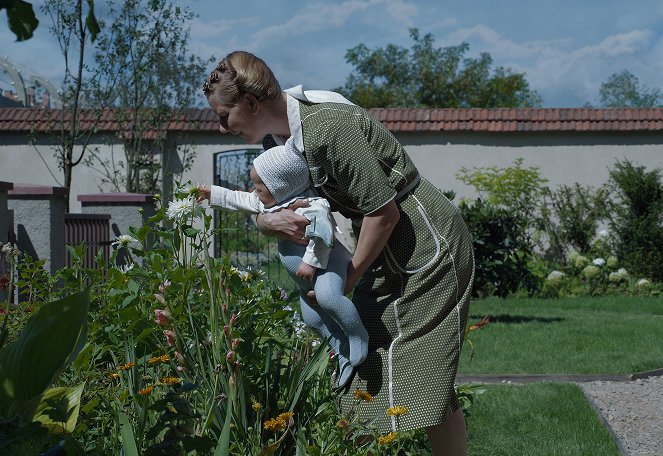Directed by:
Jonathan GlazerScreenplay:
Jonathan GlazerCinematography:
Łukasz ŻalComposer:
Mica LeviCast:
Sandra Hüller, Christian Friedel, Ralph Herforth, Freya Kreutzkam, Max Beck, Ralf Zillmann, Imogen Kogge, Stephanie Petrowitz, Marie Rosa Tietjen (more)VOD (4)
Plots(1)
The commandant of Auschwitz, Rudolf Höss, and his wife Hedwig, strive to build a dream life for their family in a house and garden next to the camp. (SF Studios Fin.)
Videos (4)
Reviews (10)
The Zone of Interest depicts the concentration camps and the Holocaust from a truly novel point of view, and this is why it will not be lost among the thematically close films. Jonathan Glazer's film does not primarily target the audience's eyes, but rather their ears and general awareness of the horrors of war: at first glance we see the ordinary life of an ordinary family, but on second viewing (or listening) and placing the film in the context of the time, it evokes extremely uncomfortable feelings. On the one hand we have an idyllic, almost 'Garden of Eden', on the other (behind the fence) we can hear screams and gunshots, while in the distance we watch the smoke (of death). To the sound of a sometimes literally poignant musical score, we witness that pure evil can take on a completely mundane, innocent form. As in Anatomy of a Fall, Sandra Hüller gives a supremely impressive performance and I'm curious to see what roles await her in the future. Last but not least, I praise the play with negative imagery, which contributed to the film's unpleasant atmosphere. Perhaps only the closing documentary insert left me with mixed feelings.
()
Such is the daily routine of a family of ordinary, decent citizens. They grow kohlrabi and carnations in the garden, keep the house in perfect order, pet the dog and frolic in the swimming pool, and all this is provided by the head of the family, who goes to work every day in an exemplary manner and who - by the way - is the director of the most monstrous concentration camp. He is, again by the way, at work dealing with, for example, the more efficient incineration of Jews in ovens, and does it with the same emotional involvement as when you and your wife are deciding what to buy for dinner at the supermarket. And behind the walls of this middle-class family's property, behind those ominous walls, is a human-scale Mordor where the most monstrous acts against humanity are taking place, and you feel an immense oppression thanks to the ingenious sound work and the ominous visual details in the distance, such as the smoke from the ovens, or from the locomotives bringing in more and more human fuel. The film doesn't shove down your throat horrific imagery about how monstrous the Holocaust is, it does it on a subliminal basis, working with your subconscious, and that actually makes it all the worse. It made me sick, but at the same time I bow down to Jonathan Glazer for this bold cinematic experiment that says more about us humans than you'd expect.
()
Auschwitz without the gunfire, the wailing and the dying. An original premise, where a lot can be invented, but where there is also a constant risk of boredom without emotions. Jonathan Glazer comes up with a version that in regular intervals shows ideas to illustrate a typical day of the head honcho of the concentration camp at the gates of Auschwitz. Although there are no downright deaf spots, as a whole, however, the film, in all its ordinariness, fails to be fully engrossing. All credit goes only to some excellent scenes, notably the Sunday fishing or the imprisonment in the greenhouse.
()
Jonathan Glazer is again powerfully creative and artsy. In The Zone of Interest, we don’t see a single Auschwitz prisoner in the film or any of the atrocities perpetrated behind the walls of the camp. The minimalistically staged but effectively arranged action takes place inside the Hösses’ villa and in their garden, which is bordered by the wall, over which the tops of the concentration-camp barracks loom. Höss dutifully goes to “work” and spends his free time with his family. Höss’s wife enjoys the flowers in the garden. Their children play by the swimming pool. Höss occasionally receives a visitor on business, such as engineers with a design for a more efficient crematorium. Sometimes someone brings them a bag of nice clothes to pick through... The whole time, we hear the distant droning of the death factory in operation, sometimes people screaming, dogs barking, gunfire. Black clouds of ash fill the sky. The Höss children’s perception of the world outside the house is also evident in small nuances. The little girl’s nocturnal dreams in black-and-white inverted images are the most impressive of the artistic ornaments with which the film is packed to the maximum satisfaction of the festival viewer. The scene with Höss on the stairs with the dark empty corridors is brilliant and the highlight of the film in my opinion. The Zone of Interest is a different view of the Holocaust, with the most unpleasant music you have ever experienced accompanying the closing credits. This puts Jonathan Glazer in the company of masters like Michael Haneke and Yorgos Lanthimos. [Cannes FF]
()
Zone of disinterest. One of those films that the teacher puts on in history class, but 80% of the students would rather pull out their cell phones and scroll through Instagram because it's almost as boring as regular class. The film is completely empty in terms of information, so it doesn't even serve an educational purpose. We follow the banalities of the daily life of a concentration camp commander and his family. We learn nothing about the characters, the dialogues are cut down to the minimum, Auschwitz is not shown, so again a film for book readers, where the viewer has to figure everything out (fck you!!), it has no script, the atmosphere doesn't work at all, there’s no build-up, no tension or escalated drama between the Nazis, the emotions below zero, and in the end, instead of showing a pile of corpses, they show only shoes. The film is so empty, slow and boring that even if you skips twenty minutes, you won’t miss anything crucial. Son of Saul was thematically similar, but somewhere else. An intimate arthouse of the highest order. 3/10.
()



Ads